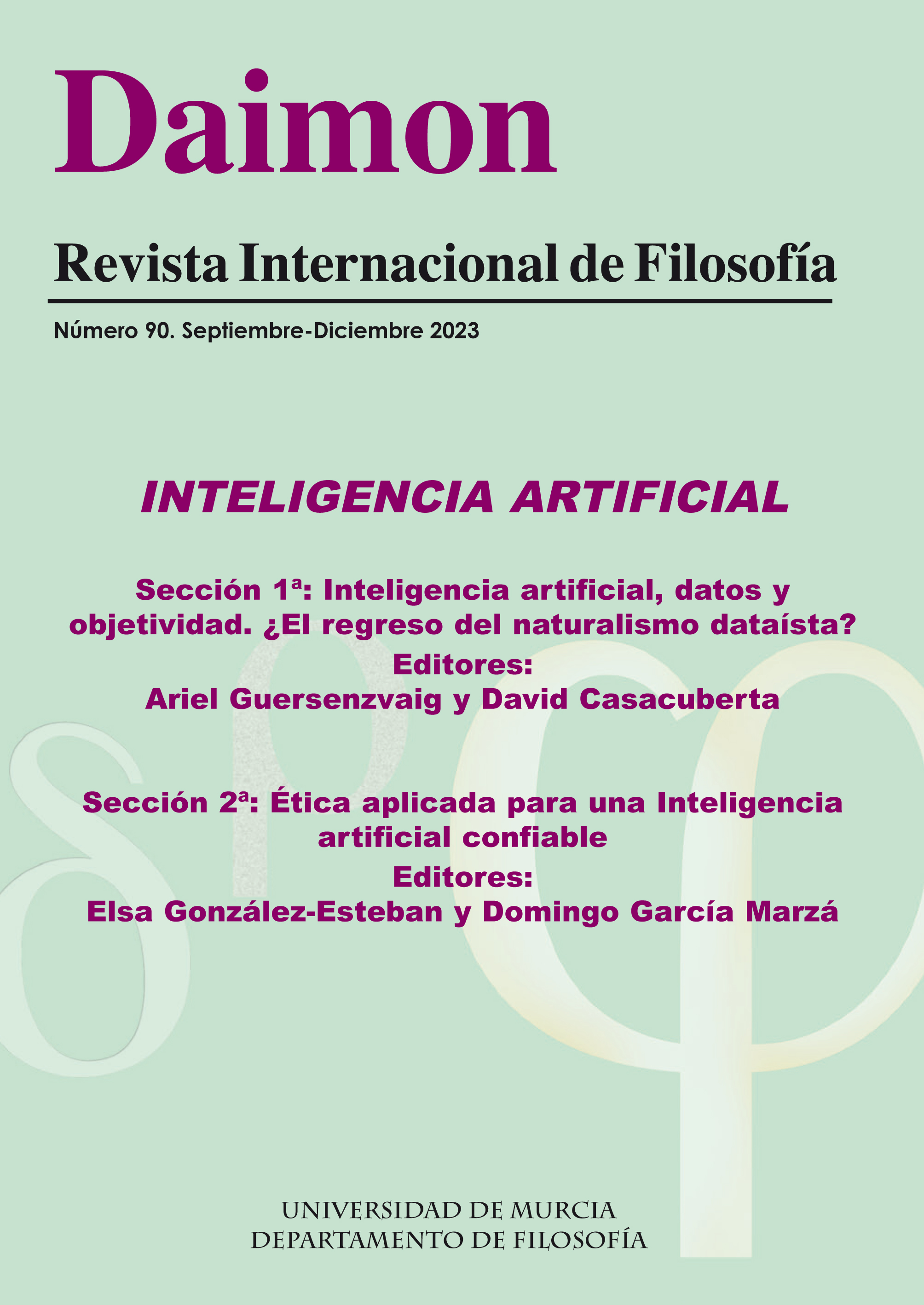The study of political polarization as academic therapy
Supporting Agencies
- Proyecto de Investigación Científica y Desarrollo “Ética cordial y Democracia ante los retos de la Inteligencia Artificial” PID2019-109078RB-C22 financiado por MCIN/ AEI /10.13039/501100011033 y en las actividades del grupo de investigación de excelencia PROMETEO CIPROM/2021/072, financiado por la Conselleria d’Innovació, Universitats, Ciència i Societat Digital de la Generalitat Valenciana.
Abstract
Studies on political polarization reveal that polarization is greater among people with a higher level of education, while people with less education are more tolerant. These disturbing results lead me to undertake an academic therapy in this work on two central ideas in academic reflection: the idea of education as a forger of a critical and tolerant citizenship, as well as the idea of the rational and self-aware subject. Finally, I will also apply academic therapy to work methodologies at the University. This academic therapy will help foster tolerance in the Academia.
Downloads
-
Abstract813
-
PDF (Español (España))413
-
HTML (Español (España))215
References
Abramowitz, A. (2010). The disappearing center: Engaged citizens, polarization and American democracy. Yale: Yale University Press.
Aristóteles (2000). Política. Madrid: Gredos.
Asch, S. E. (1956). Studies of Independence and Conformity: I A Minority of One against a Unanimous Majority. Psychological Monographs: General and Applied, 70 (9), 1-70.
Brennan, J. (2018). Contra la democracia. Madrid: Deusto.
Cortina, A. (2007). Ética de la razón cordial. Oviedo: Nobel.
Cortina, A. (2013). Para qué sirve realmente la ética. Barcelona: Paidós.
Clark, C. & Winegard, B. M. (2020). Tribalism in war and peace: The nature and evolution of ideological epistemology and its significance for modern social science. Psychological Inquiry, 31, 1-22.
Ellis, A. (1980). Razón y emoción en psicoterapia. Zarauz: Itxaropena.
Feenstra, R. y Pallarés-Domínguez, D. (2021). Las dimensiones éticas de los sistemas de valoración y difusión científica en el área de filosofía moral. Daimon. Revista Internacional de Filosofía, 83, 37-55.
Flaxman, S.; Goel, S. y Rao J. M. (2016). Filter bubbles, echo chambers and online news consumption. Public Opinion Quarterly, 80, 298-320.
Freud, S. (1989). Psicopatología de la vida cotidiana. Madrid: Alianza.
Haidt, J. (2019). La mente de los justos. Barcelona: Deusto.
Haidt, J. y Lukianoff, G. (2019). La transformación de la mente moderna. Barcelona: Deusto.
Henderson, R. (2021). Persuasion and Prestige paradox: Are high status people more likely to lie? Quillette, 3 April. Accesible en: https://quillette.com/2021/04/03/persuasion-and-the-prestige-paradox-are-high-status-people-more-likely-to-lie/ Consultado el 5 de julio de 2022.
Herreras, E. (2021). Lo que la posverdad esconde. Medios de comunicación y crisis de la democracia. Barcelona: MRA.
Hobbes, J. (2014). Leviatán. México: F.C.E.
Kuhn, T. (2001). La estructura de las revoluciones científicas. México: F.C.E.
Leng, G. y Leng, R. I. (2020). Unintended consequences: The perils of publication and citation bias, The MIT Press Reader, 15th September. Disponible en:
https://thereader.mitpress.mit.edu/perils-of-publication-and-citation-bias/. Acceso: 17 de octubre de 2022.
Malo, P. (2021). Los peligros de la moralidad. Por qué la moral es una amenaza paralas sociedades del siglo XXI. Barcelona: Deusto.
Mercier, H. y Sperber, D. (2017). The enigma of reason: a new theory of human understanding. London: Allen Lane.
Pérez Zafrilla, P. J. (2020). “Polarización política: estado de la cuestión y orientaciones para el análisis”. En C. Santibáñez (Ed.). Emociones, argumentación y argumentos. Lima: Palestra, 97-124.
Pérez Zafrilla, P. J. (en prensa). “El reverso de la aporofobia: la protección del estatus como patología social”, Daimon. Revista Internacional de Filosofía. Disponible en: https://revistas.um.es/daimon/libraryFiles/downloadPublic/12151
Pew Research Center (2016). “A wider ideological gap between more and less educated adults”. April 2016. Accesible en: https://www.pewresearch.org/politics/2016/04/26/a-wider-ideological-gap-between-more-and-less-educated-adults/. Consultado el 13 de julio de 2022.
Pew Research Center (2022). “Politics on Twitter: One-Third of Tweets From U.S. Adults Are Political”. June 2022. Accesible en: https://www.pewresearch.org/politics/2022/06/16/politics-on-twitter-one-third-of-tweets-from-u-s-adults-are-political/. Accedido en 19 de junio de 2022.
Ross, L., Bierbauer, G. y Hoffman, S. (1982). El papel de los procesos de atribución en la conformidad y el disentimiento: Reencontrando la situación de Asch. Estudios de Psicología, 10, 63-78.
Rousseau, J. J. (2000). “Discurso sobre el origen y los fundamentos de la desigualdad entre los hombres”. En Del Contrato social. Discursos. (pp.229-316). Madrid: Alianza.
Schopenhauer, A. (2003). El mundo como voluntad y representación, vol.II. Madrid: F.C.E.
Serra-García, M. y Gneezy, U. (2021). Non-replicable publications are cited more than replicable ones”, Science Advances, 7 (21), eabd1705.
Siurana, J. C. (2021). Ética para influencers. Madrid: Plaza y Valdés.
Sunstein, C. (2002). The Law of Group Polarization. The Journal of Political Philosophy, 10 (2), 175-195.
Copyright (c) 2023 Daimon Revista Internacional de Filosofia

This work is licensed under a Creative Commons Attribution-NonCommercial-NoDerivatives 3.0 Unported License.
Las obras que se publican en esta revista están sujetas a los siguientes términos:
1. El Servicio de Publicaciones de la Universidad de Murcia (la editorial) conserva los derechos patrimoniales (copyright) de las obras publicadas, y favorece y permite la reutilización de las mismas bajo la licencia de uso indicada en el punto 2.
2. Las obras se publican en la edición electrónica de la revista bajo una licencia Creative Commons Reconocimiento-NoComercial-SinObraDerivada 3.0 España (texto legal). Se pueden copiar, usar, difundir, transmitir y exponer públicamente, siempre que: i) se cite la autoría y la fuente original de su publicación (revista, editorial y URL de la obra); ii) no se usen para fines comerciales; iii) si remezcla, transforma o crea a partir del material, no podrá distribuir el material modificado.
3. Condiciones de auto-archivo. Se permite y se anima a los autores a difundir electrónicamente las versiones pre-print (versión antes de ser evaluada) y/o post-print (versión evaluada y aceptada para su publicación) de sus obras antes de su publicación, ya que favorece su circulación y difusión más temprana y con ello un posible aumento en su citación y alcance entre la comunidad académica. Color RoMEO: verde.











